Tasters from other websites
Jane Martinson...on surveillance society
A raft of outdated laws now offer unprecedented power in the digital age for the state to seize valuable information about us all...
No one is arguing that the security forces shouldn’t have power to intercept communications when serious crime is suspected. But in so many cases the crime is relatively minor – ministerial rudeness or speeding, for instance – and the safeguards meant to check the reasons for interception are valid are no longer fit for purpose.
The arguments over “metadata” go to the heart of how outdated the current laws are, with the security services routinely arguing that it’s the content of emails and phone calls that matters. This argument worked fine when a letter’s content needed protection more than its envelope, but the digital envelope now allows the security services to find out who is sharing the information, where, when and for how long. The content itself is almost immaterial for any whistleblower worried about being found consorting with the press. (30/3/15)
Hugh Grant...on RIPA
Three groups made the difference: working journalists, marshalled by the trade magazine, Press Gazette; some politicians, particularly Lib Dems, who were quick to see something had to be done; and third, Hacked Off, on whose board I sit. Hacked Off researched the issue, took specialist advice, drafted amendments in both houses, briefed MPs and peers, and did its utmost to ensure change would actually happen.
Conspicuously absent from this line-up are the editors and proprietors of our biggest national newspaper companies...They talk the talk, but when it comes to upholding the freedom of journalists to conduct investigations in the public interest, they do not walk the walk.It’s true that some editors published indignant leading articles on the subject, but most preferred victimhood to change. They wanted the world to think this was just part of an ancient pattern of oppression of the press by politicians, when in truth the original loophole in the legal protections resulted from an oversight, and there was more than enough political will to plug it.
Ciara Bottomley ...on the threat to whistleblowers
It doesn’t take much to find a number of cases where RIPA has been used by those with a motive other than the detection of crime. Leak investigations, for example.
One need look no further than the case of Osita Mba, the HMRC whistleblower. Mba lifted the lid on a £10m ‘sweetheart deal’ between HMRC and Goldman Sachs by whistleblowing.
When HMRC suspected he had spoken to The Guardian his belongings, emails, internet search records and phone calls, and those of his then wife, were intercepted by HMRC.
More recently the sources in the Plebgate and Chris Huhne scandals have also been identified under RIPA. These examples are just the cases that make the headlines. According to the 2013 report of the Interception of Communications Commissioner, half a million authorisations for RIPA requests by UK public authorities were made last year.
Persecuting journalists and their sources sends a veiled threat to others who may be about to speak out. It creates a chilling effect on whistleblowing and leaves a culture of silence in its wake. (03/12/14)
A raft of outdated laws now offer unprecedented power in the digital age for the state to seize valuable information about us all...
No one is arguing that the security forces shouldn’t have power to intercept communications when serious crime is suspected. But in so many cases the crime is relatively minor – ministerial rudeness or speeding, for instance – and the safeguards meant to check the reasons for interception are valid are no longer fit for purpose.
The arguments over “metadata” go to the heart of how outdated the current laws are, with the security services routinely arguing that it’s the content of emails and phone calls that matters. This argument worked fine when a letter’s content needed protection more than its envelope, but the digital envelope now allows the security services to find out who is sharing the information, where, when and for how long. The content itself is almost immaterial for any whistleblower worried about being found consorting with the press. (30/3/15)
Hugh Grant...on RIPA
Three groups made the difference: working journalists, marshalled by the trade magazine, Press Gazette; some politicians, particularly Lib Dems, who were quick to see something had to be done; and third, Hacked Off, on whose board I sit. Hacked Off researched the issue, took specialist advice, drafted amendments in both houses, briefed MPs and peers, and did its utmost to ensure change would actually happen.
Conspicuously absent from this line-up are the editors and proprietors of our biggest national newspaper companies...They talk the talk, but when it comes to upholding the freedom of journalists to conduct investigations in the public interest, they do not walk the walk.It’s true that some editors published indignant leading articles on the subject, but most preferred victimhood to change. They wanted the world to think this was just part of an ancient pattern of oppression of the press by politicians, when in truth the original loophole in the legal protections resulted from an oversight, and there was more than enough political will to plug it.
Ciara Bottomley ...on the threat to whistleblowers
It doesn’t take much to find a number of cases where RIPA has been used by those with a motive other than the detection of crime. Leak investigations, for example.
One need look no further than the case of Osita Mba, the HMRC whistleblower. Mba lifted the lid on a £10m ‘sweetheart deal’ between HMRC and Goldman Sachs by whistleblowing.
When HMRC suspected he had spoken to The Guardian his belongings, emails, internet search records and phone calls, and those of his then wife, were intercepted by HMRC.
More recently the sources in the Plebgate and Chris Huhne scandals have also been identified under RIPA. These examples are just the cases that make the headlines. According to the 2013 report of the Interception of Communications Commissioner, half a million authorisations for RIPA requests by UK public authorities were made last year.
Persecuting journalists and their sources sends a veiled threat to others who may be about to speak out. It creates a chilling effect on whistleblowing and leaves a culture of silence in its wake. (03/12/14)
How you can become a SubScriber
|
Sign up for email updates (no spam, about once a month)...
|
|
...make a financial contribution
I'd like to subscribe
There will never be a charge for reading SubScribe,
but if you would like to make a donation to keep it going, you can do so in a variety of ways by pressing this button. Thank you. |













